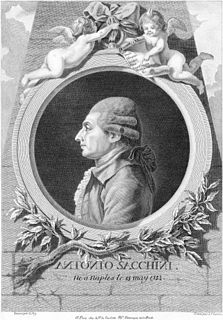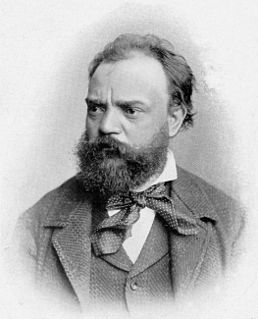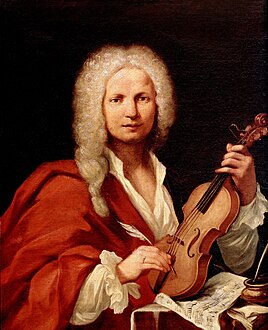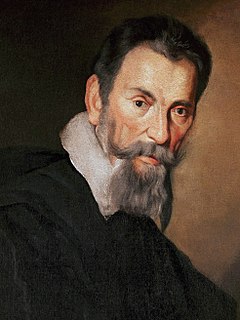
Rinaldo is an opera by George Frideric Handel, composed in 1711, and was the first Italian language opera written specifically for the London stage. The libretto was prepared by Giacomo Rossi from a scenario provided by Aaron Hill, and the work was first performed at the Queen's Theatre in London's Haymarket on 24 February 1711. The story of love, war and redemption, set at the time of the First Crusade, is loosely based on Torquato Tasso's epic poem Gerusalemme liberata, and its staging involved many original and vivid effects. It was a great success with the public, despite negative reactions from literary critics hostile to the contemporary trend towards Italian entertainment in English theatres.

Jerusalem Delivered, also known as The Liberation of Jerusalem, is an epic poem by the Italian poet Torquato Tasso, first published in 1581, that tells a largely mythified version of the First Crusade in which Christian knights, led by Godfrey of Bouillon, battle Muslims in order to take Jerusalem. Tasso began work on the poem in the mid-1560s. Originally, it bore the title Il Goffredo. It was completed in April, 1575 and that summer the poet read his work to Duke Alfonso of Ferrara and Lucrezia, Duchess of Urbino. A pirate edition of 14 cantos from the poem appeared in Venice in 1580. The first complete editions of Gerusalemme liberata were published in Parma and Ferrara in 1581.

Armida is a fictional character created by the Italian late Renaissance poet Torquato Tasso. She is a Saracen sorceress.

Antonio Maria Gasparo Gioacchino Sacchini was an Italian composer, best known for his operas.

Armida is an operatic 'dramma per musica' by Antonio Salieri in three acts, set to a libretto by Marco Coltellini. The plot is based on the epic poem Gerusalemme liberata by Torquato Tasso. Lully, Handel and Traetta, to name but a few, had already composed operas based on the situations that Tasso originally developed. The plot of all of these, and Salieri's work, is based on the relationship between Armida and the Crusader Rinaldo.

Armida is an opera by Antonín Dvořák in four acts, set to a libretto by Jaroslav Vrchlický that was originally based on Torquato Tasso's epic La Gerusalemme liberata. Dvořák's opera was first performed at Prague's National Theatre on 25 March 1904; the score was published as opus 115 in 1941.
Nicolas-François Guillard was a French librettist. He was born in Chartres and died in Paris, the recipient of a government pension in recognition of his work writing librettos. He was also on Comité de Lecture of the Paris Opéra. One of the foremost of the French librettist of his generation, he wrote libretti for many noted composers of the day, including Salieri and in particular Sacchini. His most famous work is Iphigénie en Tauride, his first libretto, set by Gluck after the composer had initially rejected it. Gluck collaborated with Guillard to heavily recast the libretto, not only to suit Gluck's artistic preferences, but also to accommodate pre-existing music that Gluck borrowed, both from himself and from other composers, when composing the opera.

L'Armida immaginaria is a dramma giocoso in three acts by composer Domenico Cimarosa with an Italian libretto by Giuseppe Palomba. The opera was first performed in Naples during the summer of 1777 at the Teatro di Fiorentini.

Armida Abbandonata is an opera in three acts by the Italian composer Niccolò Jommelli. The libretto, by Francesco Saverio De Rogatis, is based on the epic poem Jerusalem Delivered by Torquato Tasso. The opera was first performed at the Teatro San Carlo, Naples, on 30 May 1770. The young Wolfgang Amadeus Mozart was in the audience. He described the work as "beautiful but too serious and old-fashioned for the theatre". Nevertheless, despite a lukewarm reception at its premiere, Armida abbandonata was widely performed throughout Italy in the following years.

Armida al campo d'Egitto is an opera in three acts by Antonio Vivaldi to a libretto by Giovanni Palazzo. It was first performed during the Carnival season of 1718 at the Teatro San Moisè in Venice. Vivaldi's version is different from the more than 50 operas whose themes derive in varying degrees from the story of Rinaldo and Armida in Torquato Tasso's epic poem La Gerusalemme liberata. Unlike the more than 50 operas based on the romance of Rinaldo and Armida, Vivaldi's version starts during previous events before the war against the Crusaders. Armida was revived for the Carnival season of 1738, with much of the music rewritten, and arias by Leonardo Leo added. Act II of the original version of the opera is now lost.
Armida is a beautiful enchantress in Torquato Tasso's Jerusalem Delivered.
Armida is an opera by British composer Judith Weir. It premiered on 25 December 2005 as a television broadcast on the UK station, Channel 4 which had commissioned the work. The English libretto, also written by Weir, is loosely based on the story of Rinaldo and Armida, in Torquato Tasso's 1581 epic poem set in the First Crusade, La Gerusalemme liberata.

Armida is an opera in three acts by Josef Mysliveček set to a libretto by Giovanni Ambrogio Migliavacca based on an earlier libretto by Philippe Quinault. It is one of many operas set at the time of the Crusades that is based on characters and incidents from Torquato Tasso's epic poem La Gerusalemme liberata. This opera belong to the serious type in Italian language referred to as opera seria. It incorporates many elements from the operatic "reform" movement of the 1770s, including short vocal numbers and short choruses incorporated into the fabric of the drama and lavish use of accompanied recitative.

Renaud is an opera by Antonio Sacchini, first performed on 28 February 1783 by the Académie Royale de Musique at the Théâtre de la Porte Saint-Martin in Paris. It takes the form of a tragédie lyrique in three acts. The French libretto, by Jean-Joseph Lebœuf, is based on Cantos XVII and XX of Torquato Tasso's epic poem Gerusalemme liberata and, more directly, on the five-act tragedy by Simon-Joseph Pellegrin, Renaud, ou La suite d'Armide, which had been set to music by Henri Desmarets in 1722 and was intended as a sequel to Lully's famous opera Armide. According to Théodore Lajarte, Lebœuf was helped by Nicolas-Étienne Framery, the regular translator of Sacchini's libretti.

The Italian composer Claudio Monteverdi (1567–1643), in addition to a large output of church music and madrigals, wrote prolifically for the stage. His theatrical works were written between 1604 and 1643 and included operas, of which three—L'Orfeo (1607), Il ritorno d'Ulisse in patria (1640) and L'incoronazione di Poppea (1643)—have survived with their music and librettos intact. In the case of the other seven operas, the music has disappeared almost entirely, although some of the librettos exist. The loss of these works, written during a critical period of early opera history, has been much regretted by commentators and musicologists.

Chimène, ou Le Cid is a French-language opera by Antonio Sacchini. It takes the form of a tragédie (lyrique) in three acts, with a libretto by Nicolas-François Guillard. It was first staged at Fontainebleau on 16 November 1783. The subject of the work was inspired by the tragicomedy Le Cid by Pierre Corneille, and indirectly by the medieval Spanish epic Cantar de Mio Cid and a play by Guillén de Castro y Bellvís, Las Mocedades del Cid. Comedia Comedia primera and segunda (1605–1615).

Arvire et Évélina is a French-language opera by Antonio Sacchini, first performed at the Académie Royale de Musique on 29 April 1788. It takes the form of a tragédie lyrique in three acts. The libretto, by Nicolas-François Guillard, is based on the dramatic poem Caractacus (1759) by William Mason. It was Sacchini's last opera and the score was left incomplete at the time of the composer's sudden death in October 1786. The missing music was written by Jean-Baptiste Rey.
Renaud, ou La suite d'Armide is an opera by the French composer Henri Desmarets, first performed at the Académie Royale de Musique on 5 March 1722. It takes the form of a tragédie en musique in a prologue and five acts. The libretto, by Simon-Joseph Pellegrin, is based on Torquato Tasso's Gerusalemme liberata. The opera is a sequel to Jean-Baptiste Lully's Armide (1686).











